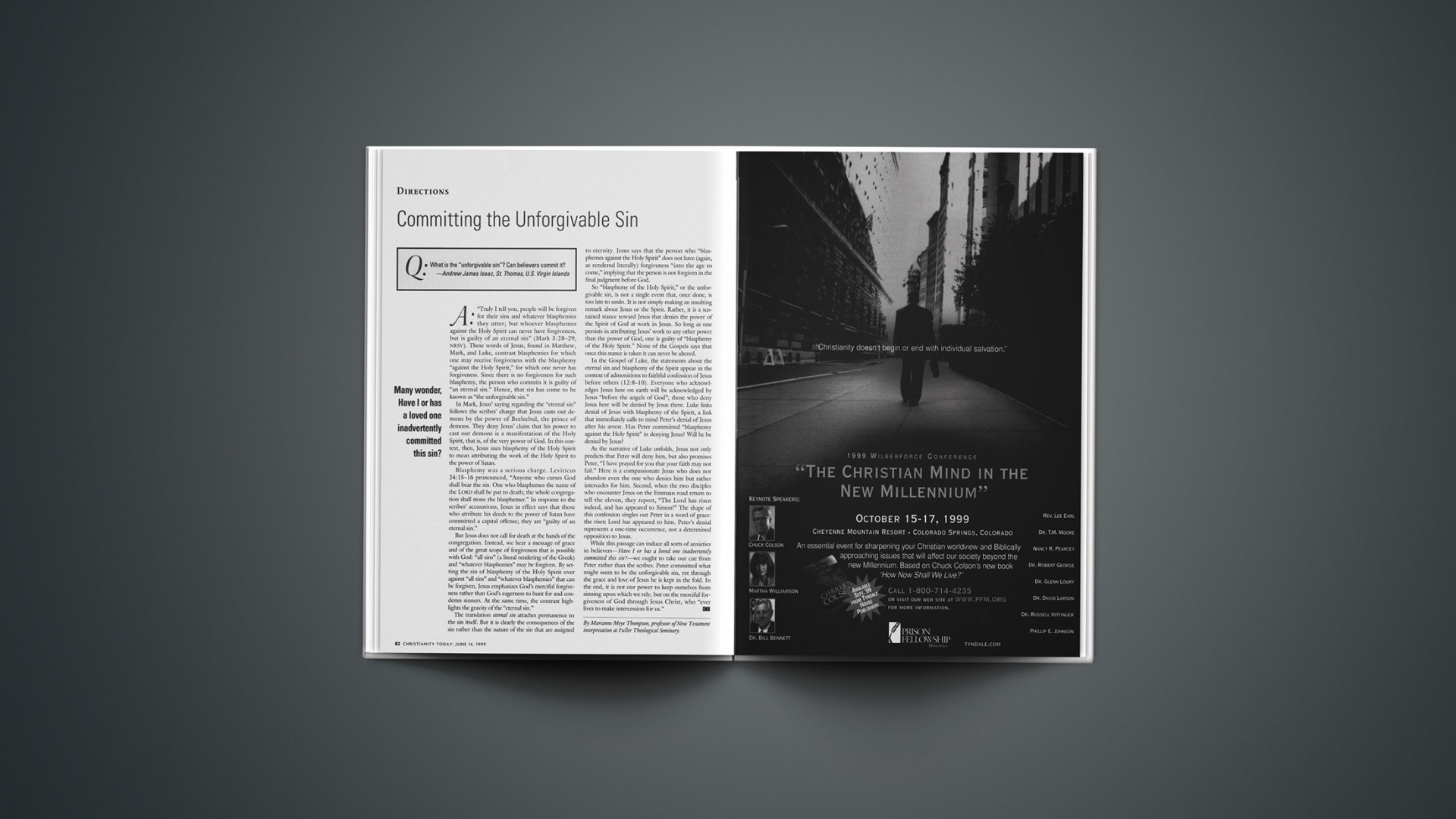Q: What is the “unforgivable sin”? Can believers commit it?—Andrew James Isaac, St. Thomas, U.S. Virgin Islands
A: “Truly I tell you, people will be forgiven for their sins and whatever blasphemies they utter; but whoever blasphemes against the Holy Spirit can never have forgiveness, but is guilty of an eternal sin” (Mark 3:2829, NRSV). These words of Jesus, found in Matthew, Mark, and Luke, contrast blasphemies for which one may receive forgiveness with the blasphemy “against the Holy Spirit,” for which one never has forgiveness. Since there is no forgiveness for such blasphemy, the person who commits it is guilty of “an eternal sin.” Hence, that sin has come to be known as “the unforgivable sin.”
Many wonder, Have I or has a loved one inadvertently committed this sin?
In Mark, Jesus’ saying regarding the “eternal sin” follows the scribes’ charge that Jesus casts out demons by the power of Beelzebul, the prince of demons. They deny Jesus’ claim that his power to cast out demons is a manifestation of the Holy Spirit, that is, of the very power of God. In this context, then, Jesus uses blasphemy of the Holy Spirit to mean attributing the work of the Holy Spirit to the power of Satan.
Blasphemy was a serious charge. Leviticus 24:1516 pronounced, “Anyone who curses God shall bear the sin. One who blasphemes the name of the LORD shall be put to death; the whole congregation shall stone the blasphemer.” In response to the scribes’ accusations, Jesus in effect says that those who attribute his deeds to the power of Satan have committed a capital offense; they are “guilty of an eternal sin.”
But Jesus does not call for death at the hands of the congregation. Instead, we hear a message of grace and of the great scope of forgiveness that is possible with God: “all sins” (a literal rendering of the Greek) and “whatever blasphemies” may be forgiven. By setting the sin of blasphemy of the Holy Spirit over against “all sins” and “whatever blasphemies” that can be forgiven, Jesus emphasizes God’s merciful forgiveness rather than God’s eagerness to hunt for and condemn sinners. At the same time, the contrast highlights the gravity of the “eternal sin.”
The translation eternal sin attaches permanence to the sin itself. But it is clearly the consequences of the sin rather than the nature of the sin that are assigned to eternity. Jesus says that the person who “blasphemes against the Holy Spirit” does not have (again, as rendered literally) forgiveness “into the age to come,” implying that the person is not forgiven in the final judgment before God.
So “blasphemy of the Holy Spirit,” or the unforgivable sin, is not a single event that, once done, is too late to undo. It is not simply making an insulting remark about Jesus or the Spirit. Rather, it is a sustained stance toward Jesus that denies the power of the Spirit of God at work in Jesus. So long as one persists in attributing Jesus’ work to any other power than the power of God, one is guilty of “blasphemy of the Holy Spirit.” None of the Gospels says that once this stance is taken it can never be altered.
In the Gospel of Luke, the statements about the eternal sin and blasphemy of the Spirit appear in the context of admonitions to faithful confession of Jesus before others (12:810). Everyone who acknowledges Jesus here on earth will be acknowledged by Jesus “before the angels of God”; those who deny Jesus here will be denied by Jesus there. Luke links denial of Jesus with blasphemy of the Spirit, a link that immediately calls to mind Peter’s denial of Jesus after his arrest. Has Peter committed “blasphemy against the Holy Spirit” in denying Jesus? Will he be denied by Jesus?
As the narrative of Luke unfolds, Jesus not only predicts that Peter will deny him, but also promises Peter, “I have prayed for you that your faith may not fail.” Here is a compassionate Jesus who does not abandon even the one who denies him but rather intercedes for him. Second, when the two disciples who encounter Jesus on the Emmaus road return to tell the eleven, they report, “The Lord has risen indeed, and has appeared to Simon!” The shape of this confession singles out Peter in a word of grace: the risen Lord has appeared to him. Peter’s denial represents a one-time occurrence, not a determined opposition to Jesus.
While this passage can induce all sorts of anxieties in believers—Have I or has a loved one inadvertently committed this sin?—we ought to take our cue from Peter rather than the scribes. Peter committed what might seem to be the unforgivable sin, yet through the grace and love of Jesus he is kept in the fold. In the end, it is not our power to keep ourselves from sinning upon which we rely, but on the merciful forgiveness of God through Jesus Christ, who “ever lives to make intercession for us.”
Copyright © 1999 Christianity Today. Click for reprint information.










